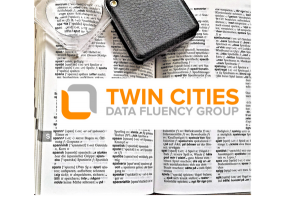By Dave Mathias
 The Twin Cities Data Fluency Group had its second meeting on May 21. This month involved an engaging discussion titled “How the business can better work with analytics and tech partners.” Tricia Duncan and myself moderated three great panelists—Nate Hallquist from Syngenta, Serena Roberts from Capella, and Jack Vishneski from ThreeBridge and consulting with Cargill.
The Twin Cities Data Fluency Group had its second meeting on May 21. This month involved an engaging discussion titled “How the business can better work with analytics and tech partners.” Tricia Duncan and myself moderated three great panelists—Nate Hallquist from Syngenta, Serena Roberts from Capella, and Jack Vishneski from ThreeBridge and consulting with Cargill.
There was lively discussion on several fronts, but key takeaways were as follows:
- Building relationships is key. Most information work takes teams and that means working with people. As Nate mentioned, the more you build relationships the better your chance to succeed.
- Bring everything back to problem being solved. Data and analytics only serve a purpose if they solve problems. As Jack succinctly noted, it is all about solving problems, and bringing conversations back to those problems will help ensure success.
- Trust is key. As Serena mentioned, being a trusted advisor as both an analyst and business partner is a must. Serena has the unique experience of playing both roles in sales and sales enablement, and building trust wearing both these hats has been essential to her success.
- Rapid prototyping should be norm. Rapid prototyping is a must for dashboards to help ensure customer satisfaction and efficiency. These rapid prototypes can be done in a dashboard tool if a similar dataset is available, but can just as easily be hand drawn on a whiteboard or paper.
In addition to these takeaways, there was a good discussion on the role of self-service business intelligence (BI) and how much autonomy the business should have versus how much of it should stay in analyst, data science, or technology hands. There were mixed feelings here both on the panel and in the audience. Some companies have shown more success than others in distributing data fluency and technology into the business. However, there was agreement that tools are making it more accessible for end users to do more challenging problems.
One metaphor that seemed to resonate is that self-service BI should be treated as a grocery store and not a treasure chest. As Nate described this, the analyst, technology, or data science groups ensure that often-used data is made available with appropriate cleaning, integrity, and trust to business users. However, organizations need to ensure end users have proper training, tools, and help available so they can focus on conversations and insights while reducing the risk of invalid data models or technical debt.
There was a lot of agreement that data fluency is critical for organizations broadly and the language of data will be more easily picked up by some than others. But, to have a data-driven or data-informed culture at an organization requires your people to be data fluent.
This is a short summary of the great discussion that occurred, and all are welcome to attend the next TC Data Fluency MeetUp in July (date TBD). If you are an analyst or data scientist, then this is a great opportunity to bring one or more of your business partners to help further your relationship.
Thank you to Nate, Serena, Jack, and everyone that attended, and Tricia, Nate, and I hope to see you in July.
Dave Mathias is a MinneAnalytics Board Member, as well as CEO and Founder of Beyond the Data, a product and analytics consultancy firm. In addition to MinneAnalytics, he serves on the boards of the Minnesota Product Development and Management Association and Ally People Solutions.
